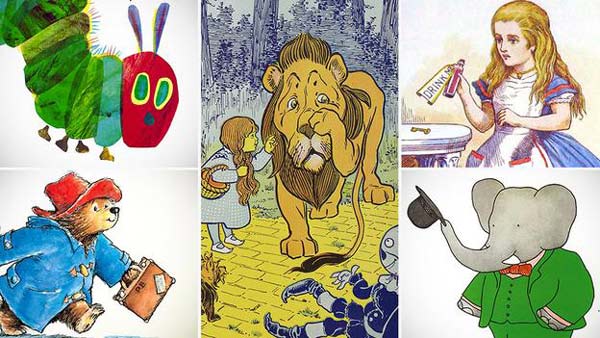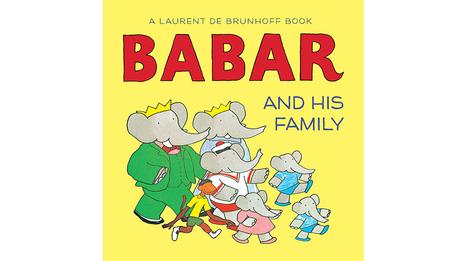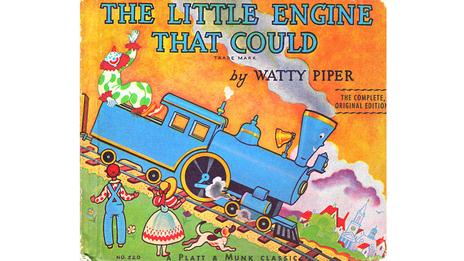Adults often find surprising subtexts in children’s literature – but are they really there? Hephzibah Anderson delves into the world of Freud and fairy tales.
成年人常会在儿童文学中发现令人惊讶的潜台词,事实果真如此吗?赫弗齐芭·安德森对弗洛伊德心理学和童话世界进行了深入研究。

As a child many of my favourite books had food as a theme. One in particular told the story of a boy who helped save his local burger bar by becoming a gastro-sleuth to track down a lost secret ingredient.
我小时候最喜欢的书都是关于吃的,其中一本讲了一个小男孩变身美食侦探,追寻丢失的的秘密食谱,从而成功挽救当地汉堡店的故事。
Long after losing track of the book and forgetting its title, I found myself in Edinburgh to interview Alexander McCall Smith. He was already the mega-selling author of The No 1 Ladies’ Detective Agency series, but years earlier, he had published a few children’s books. There among them on a shelf was The Perfect Hamburger.
许多年过去,我早就弄丢了那本书,书名也记不清了。有一次,我在爱丁堡采访亚历山大·麦考尔·史密斯。他写的《第一女子侦探事务所》系列已经荣登畅销榜。采访中,我了解到几年前他还发行了几本儿童读物,其中一本叫做《完美的汉堡》,正摆在他的书架上。
It was my book. Except that it wasn’t – not really. While burgers do indeed feature in lip-smacking detail, this time it was clear to me that The Perfect Hamburger is actually a tale of corporate greed and the fate of small businesses forced to compete with big chains.
这正是我童年时读过的那本书,但又不完全是。书中对汉堡的美味有很多细节描写,令人垂涎欲滴,但现在的我终于明白,《完美的汉堡》其实反映了企业的贪婪和小店铺被迫与大连锁店抗争的命运。
Revisiting kids’ books in adulthood can yield all sorts of weird and wonderful subtexts, some more obvious than others. How could Dr Seuss’s How the Grinch Stole Christmas be anything other than a parable of consumerism? Why would it not seem blindingly clear that CS Lewis’s The Chronicles of Narnia are in fact a fantastical re-imagining of Christian theology?
成年后重温儿童读物,可以读出各种怪异和奇妙的潜台词,其中有一些表现得非常明显。瑟斯博士的《圣诞怪杰》竟然是一个关于消费主义的寓言;CS刘易斯的《纳尼亚传奇》其实是对基督教神学的新幻想。
Similar close readings have rendered the Paddington Bear books fables about immigration and Babar the Elephant an endorsement of French colonialism. Alice’s Wonderland adventures have been seen as everything from a paean to mathematical logic to a satire about the War of the Roses or a trippy caper with drugs as an underlying theme. And what about The Little Engine That Could? You might know it as a story about trains that fosters can-do optimism, but it has also been taken as a you-go-girl feminist tale. (The eponymous little engine is a lady train and when she breaks down, only another female train will stop to help out.) As for The Wonderful Wizard of Oz: why, it’s an allegorical representation of the debate surrounding late 19th Century US monetary policy, of course.
细细品读,你也能从其他儿童读物中看出潜台词来:《帕丁顿熊》是一本关于移民问题的寓言,《小象巴巴的故事》流露出对法国殖民主义的认同;《爱丽丝梦游仙境》花样百出,从对数学逻辑的赞歌到对玫瑰之战的讽刺,甚至是吸食毒品后产生的幻觉……《勇敢的小火车头》呢?你可能只知道这是一个关于小火车的乐观向上的故事,但这本书却也被认为是女权主义小说。(与书本同名的故事主角是一个拟人的女性化火车,出现故障时,其他的女性化火车就会停下来帮助她。)至于《绿野仙踪》,当然是讽喻美国十九世纪末关于货币政策的争议了。
Digging deep
深度挖掘
It’s easy to poke fun at some of these more outlandish readings. Could they perhaps be the products of parents so addled by a text that, following their umpteenth nightly recital, the words start acting like one of those magic-eye images? Stare at them long enough and sense will materialise. Or nonsense. How else could a 22-page picture book like The Very Hungry Caterpillar yield capitalist, Christian, feminist, Marxist, queer and anti-liberal messages?
人们很容易对这种荒诞不经的解读嗤之以鼻。会不会是父母们在第无数次讲睡前故事时,在睡意朦胧中无意识添加的?就像是魔幻三维图片,长时间盯着它们看,图形就会浮现出来。否则该如何解释一本小书能包含这么多潜台词?就好比一本只有22页的《好饿好饿的毛毛虫》,怎么可能影射了资本主义、基督教、女权主义、马克思主义、同性恋文化和反自由主义?

“I don’t think you can ever dig too deeply for meaning,” says Dr Alison Waller, Senior Lecturer at the University of Roehampton’s National Centre of Research for Children’s Literature. Her favourite class involves applying psychoanalytical theory to Judith Kerr’s The Tiger Who Came to Tea, resulting in some decidedly Oedipal interpretations of that big cat and his relationship to the family.
罗汉普顿大学全国儿童文学研究中心的高级讲师艾莉森·沃勒博士认为:“对意义的深度挖掘,永远都不为过。”在她最喜欢的课程中,她会用心理学理论来分析朱迪思·克尔的《来喝茶的老虎》,进而解读出这只老虎有明显的恋母情结,并分析它与家庭的关系。
“This is a very simple story, but simplicity is not the same as a lack of depth. There are some exquisite picture books that tackle existential issues like death and sadness head on: Michael Rosen’s Sad Book and The Red Tree by Shaun Tan are great examples.” Just because we might not be aware of such adult messages when we read books as kids, doesn’t mean we aren’t absorbing them, she adds. “However far this kind of ‘message’ seems to leap out at the adult reader, it is probably closer to the truth to say that the message has always been there but the knowledge that allows it to be recognised has not.”
“这是一个非常简单的故事,但是简单并不代表缺乏深度。有些儿童读物会涉及一些存在性问题,比如死亡和悲伤。迈克尔·罗森的《悲伤之书》和陈志勇的《红树》就是最好的例子。”她补充道。虽然小时候阅读时可能没有意识书中暗含着这样的哲理,但这并不意味着我们没有在潜意识中学习了这些道理。“不管成年人觉得这些道理讲得多么明显,事实很可能是道理一直在书中,但小时候的我们没看出来。”
Of course, sometimes meanings seem hidden because we’re too caught up in the story, or because we’re simply too young. Only as an adult does Waller recognise the motivation of Max’s mother in sending him to bed without supper when she reads Maurice Sendak’s Where the Wild Things Are.
当然,有时因为深陷故事情节,或者仅仅是因为太年轻,我们没法那么明显地看出书中暗含的意义。沃勒博士长大后才明白,为什么马克思的妈妈不让他吃饭就撵他上床,给他读莫里斯·森达克的《野兽家园》。
Such layered meanings are crucial to the longevity of stories that become classics, fairy tales being a prime example. According to the Austrian-American psychoanalytic thoerist Bruno Bettelheim, Hansel and Gretel is far more than an account of parents who abandon their offspring and the evil witch who tries to kill them. It is about children’s regression and ‘oral greed’, about separation anxiety and starvation fear. Bettelheim’s 1976 study The Uses of Enchantment explains the therapeutic importance of fairy tales in children’s education. Applying neo-Freudian analysis to stories including Cinderella and Snow White, he showed how these narratives address the unconscious in a language similar to dreams, helping kids deal with a plethora of unspoken fears and desires, from sibling rivalry to ambivalence toward their parents.
有些故事之所以经久不衰、流传千年,意义分层是一个重要的原因。童话故事是一个很好的例子。美籍奥地利心理分析理论家布鲁诺·贝特兰认为,《糖果屋历险记》不止叙述了被父母遗弃的孩子造恶魔威胁的故事。这本书更深层的意义在于表现孩子的退行和贪嘴,以及他们对离别的焦虑和对饥饿的恐惧。1976年,贝特尔海姆研究了《魔法的用处》,并解释了神话治疗法在儿童教育中的重要性。他用新弗洛伊德主义分析了《灰姑娘》和《白雪公主》等故事,分析出童话叙述是怎样用一种类似梦境的语言,在无意间帮助孩子处理恐惧和渴望这些无法言说的情绪,比如兄弟姐妹之争和与父母之间的矛盾。
No age limit
老少咸宜
So-called children’s literature has plenty to offer adults, too argues Dr Sheldon Cashdan, professor of psychology at the University of Massachusetts, Amherst. As he explains in his book The Witch Must Die: The Hidden Meaning of Fairy Tales, these stories enable kids to see the struggle between good and bad – a struggle that they feel within themselves – acted out on the page, with good prevailing and the witch meeting an invariably gruesome end.
马萨诸塞州立大学阿姆赫斯特分校的心理学教授谢尔顿·卡什丹称,成人也可以从阅读所谓的儿童读物中受益良多。他在《女巫一定得死:童话如何塑造性格》一书中解释道,孩子们可以从神话故事中读到“善恶之争”,并且自己加以体会。这些故事的结局都是善战胜恶,女巫必定下场悲惨。
These battles persist throughout life. “Notions of greed, of wanting more than you actually need – you can see this in the bonuses of hedge fund managers and [people who have] houses with five bathrooms. Or the subtle, maybe not so subtle, ways that people lie – dating and telling things that aren’t exactly true, fudging their income tax returns”.
其实,“善恶之争”会贯穿我们一生。“贪婪和永不知足也存在于成人世界,存在于对冲基金经理丰厚的奖金中,存在于配备五间浴室的豪宅里,存在于成年人或微妙或明显的欺骗行为中,比如向约会对象撒谎,捏造所得税申报单等。”

To underscore his point, he’s just published a novel called Emma von N, about a woman who goes into therapy with Freud as a young girl then returns as an adult and becomes Freud’s mistress. She is consumed by fairy tales and constantly refers to them, finding them useful metaphors for all that life throws at her. Even when she’s trapped in a miserable arranged marriage, she can imagine herself to be the heroine of Rumpelstiltskin, awaiting the one who will help her spin gold from straw.
为了强调自己的观点,谢尔顿写了一本名为《艾玛·冯》的小说,女主角小时候接受弗洛依德的治疗,从怪病中痊愈,多年后成人回国并成为弗洛依德的情妇。她沉迷于童话,分不清现实和故事,总将自己的遭遇想象成童话情节。即使在陷入一段悲惨的包办婚姻后,仍把自己想象成《小矮人》里的女主角,等待着能把稻草编织成金子的王子出现。
It’s only as adults that we make the mistake of thinking that children’s literature, along with fairy tales, is essentially escapist. When we pick these books up decades later, we’re surprised to learn what we doubtless always sensed as kids, even if we lacked the vocabulary to articulate it: that these stories are about eternal human strengths and weaknesses, about how to exist in the world.
只有成年人会错误的认为儿童文学和神话故事本质上是在逃避现实。数十年后当我们重读这些书,必会惊讶地发现我们的感觉和童年时代毫无二致,只不过彼时我们缺乏描述它们的词汇:童话讲述的是人类永恒的勇气和弱点,以及如何在这个世界上生存。
Then again, the hidden nature of their messages is crucial to their magic. As Bettelheim noted, explaining to a child what makes a story so captivating would ruin it. Its power to enchant “depends to a considerable degree on the child’s not quite knowing why he is delighted by it”.
然而,正是潜台词成就了童话的魅力。正如贝特尔海姆所述,给孩子解释为什么一个故事如此迷人只会毁了这个童话。童话最奇妙的地方就在于“儿童常常为童话吸引,却不知其为何故”。
In other words, the next time your children nag you to read The Very Hungry Caterpillar at bedtime, think of it as the tale of one creature’s obsessive-compulsive quest to fill a hole that can’t be filled, or as a prose poem about demonic possession – just be sure to stick to the words on the page.
换句话说,下次你的孩子在睡前吵着要你读《好饿好饿的毛毛虫》,你可以在脑海中把它理解成一个强迫症似的不断填充永远无法填满的洞的过程,或是一首带有魔法的散文诗,但是同时,请务必一字一字按照字面意思向他娓娓道来。
(译者 quella0 编辑 丹妮)
